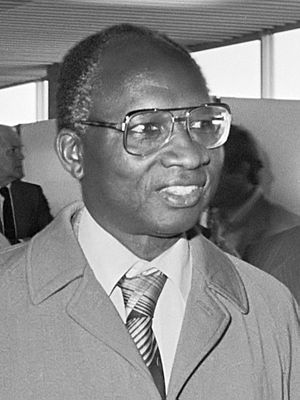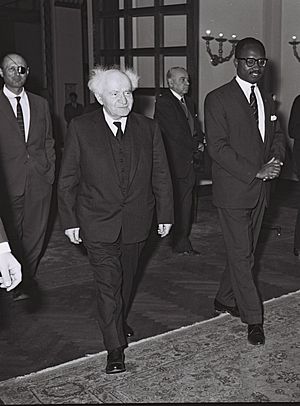Dawda Jawara facts for kids
Quick facts for kids
Sir Dawda Jawara
|
|
|---|---|

Jawara in 1979
|
|
| 1st President of the Gambia | |
| In office 24 April 1970 – 22 July 1994 |
|
| Vice President | Sheriff Mustapha Dibba Assan Musa Camara Alhajie Alieu Badara Njie Bakary Bunja Darbo Saihou Sabally |
| Preceded by | Elizabeth II as Queen of the Gambia |
| Succeeded by | Yahya Jammeh |
| Vice President of Senegambia | |
| In office 12 December 1981 – 30 September 1989 |
|
| President | Abdou Diouf |
| Prime Minister of the Gambia | |
| In office 12 June 1962 – 24 April 1970 |
|
| Monarch | Elizabeth II |
| Preceded by | Pierre Sarr N'Jie |
| Succeeded by | Office abolished |
| Personal details | |
| Born |
Dawda Kairaba Jawara
16 May 1924 Barajally, MacCarthy Island Division, British Gambia |
| Died | 27 August 2019 (aged 95) Bakau, Fajara, The Gambia |
| Political party | People’s Progressive Party (PPP) |
| Spouses | |
| Children | Bolumbo Jawara (b. 1978) |
| Alma mater | University of Glasgow University of Liverpool University of Edinburgh |
Sir Dawda Kairaba Jawara (16 May 1924 – 27 August 2019) was an important politician from The Gambia. He served as the Prime Minister from 1962 to 1970. Later, he became the first President of The Gambia from 1970 to 1994.
Jawara was born in a village called Barajally. He studied at the Methodist Boys' School in Banjul and then at Achimota School in Ghana. He trained to be a veterinary surgeon at the University of Glasgow, University of Liverpool, and University of Edinburgh.
In 1953, he returned to The Gambia and started working as a veterinary officer. He then decided to join politics. He became a leader in the new People's Progressive Party (PPP). In 1960, he was elected to the House of Representatives.
Jawara became the first Prime Minister of The Gambia in 1962. Under his leadership, The Gambia gained independence from the United Kingdom in 1965. In 1970, The Gambia became a republic, meaning it no longer had a king or queen. Jawara was then elected as its first President.
His time as president faced a big challenge in 1981 when there was an attempted coup. Soldiers from neighboring Senegal had to help stop it. After this, Jawara and the President of Senegal, Abdou Diouf, tried to create a union called the Senegambia Confederation. However, this union ended in 1989.
Jawara continued to lead until 1994. A coup led by Yahya Jammeh took over power. After this, Jawara lived in another country for a while. He returned to The Gambia in 2002 and lived there until he passed away.
Contents
Early Life and School Days
Dawda Jawara was born in 1924 in a village called Barajally Tenda. This village is in the central part of The Gambia. It is about 150 kilometers (93 miles) from the capital city, Banjul. Dawda was one of six sons.
His father, Almammi, was a successful trader. His family, the Jawaras, had a history of being important people.
When he was young, Dawda went to local Arabic schools. There, he learned to memorize the Quran. This was a common tradition for many children in The Gambia. There were no primary schools in his village. The closest one was in Georgetown, but it was only for the sons of chiefs.
Around 1933, a friend of his father helped pay for Dawda's formal education. Dawda went to Mohammedan primary school. After that, he won a scholarship to a high school for boys. He enjoyed all his classes, especially science and math.
In 1945, he finished high school. He worked as a nurse at Victoria Hospital in Bathurst (now Banjul) until 1947. There were not many job or education chances in The Gambia back then. So, he spent a year studying science at Achimota College in Ghana. While at Achimota College, Jawara was not very interested in politics. This was a time when many African countries wanted to become independent.
After Achimota College, Jawara won another scholarship. He went to Glasgow University in Scotland. There, he studied to become a veterinary doctor. It was rare for Gambians to get scholarships in science.
In the late 1940s, his interest in politics grew. In 1948, he joined the African Students Association. He later became its secretary-general and president. He also joined the Student Labour Party Organization. He learned a lot about politics during this time. He finished his studies in 1953. Later, in 1957, he got another diploma in tropical veterinary medicine from the University of Edinburgh.
Starting His Political Journey
When Jawara returned to The Gambia in 1953, he first worked as a veterinary surgeon. In 1955, he married Augusta Mahoney. She was the daughter of a well-known man in Bathurst.
As a veterinary officer, Jawara traveled all over The Gambia. He vaccinated cattle and met many cattle owners. These people later became his first political supporters. At that time, The Gambia was divided into two parts by the British. Only people in the "colony" area could vote.
In 1959, a group of people decided to change their political party's name. They wanted to challenge the parties based in the cities. This new party was called the Protectorate People's Party.
That same year, a group came to Jawara. They asked him to be the secretary of the new party. Jawara quit his job as chief veterinary officer. He wanted to run in the 1960 election. The Protectorate People's Party was renamed the People's Progressive Party (PPP). This was to make it open to everyone. Over time, the PPP and Jawara became very popular. Jawara became the party leader easily. He was one of the few university graduates from the rural areas.
Gambia Becomes Independent
In 1962, Jawara became the prime minister. This set the stage for the PPP and Jawara to lead The Gambia for a long time. After the 1962 elections, the British government slowly started to leave The Gambia. The country gained self-government in 1963. Jawara was appointed Prime Minister that year.
Finally, The Gambia became fully independent on February 18, 1965. This was a peaceful change from being a colony.
The Gambia had a small government staff. Jawara and the PPP wanted to build a strong nation. They aimed to develop the economy for both farmers and city people. Many people in rural areas hoped that independence would quickly make their lives better. However, people soon realized that leaders could not keep all their promises.
Between 1962 and 1965, Jawara also started talking with Senegal. In 1962, he asked the United Nations to study the future of Senegal and The Gambia together. In 1964, after a visit from Senegal's President Léopold Sédar Senghor, they announced plans. They wanted to work together on their economies, especially in farming.
The 1981 Coup Attempt
The biggest challenge to Dawda Jawara's rule happened in 1981. This was an attempted coup led by a former politician named Kukoi Samba Sanyang. The coup happened on July 29, 1981. It followed a time when the economy was weak. There were also claims of corruption against some politicians.
President Jawara immediately asked for military help from Senegal. Senegal sent troops to The Gambia. By August 6, the Senegalese troops had defeated the coup leaders. Many lives were lost during the coup attempt.
The attempted coup showed that some people wanted change. It also showed weaknesses within the ruling PPP party. After the coup attempt, Jawara was in London. He flew to Dakar to talk with President Abdou Diouf of Senegal. Senegal's help saved Jawara's government. However, it also meant The Gambia relied more on Senegal. This caused some unhappiness.
The Senegambian Confederation
Three weeks after the coup attempt, Presidents Diouf and Jawara announced a plan. They wanted to create the Senegambia Confederation. In December 1981, they signed the agreements. Many people felt this union was made too quickly. They also felt that most Gambians did not have a say.
Under the agreement, Diouf was the president, and Jawara was his vice president. They set up a shared parliament and cabinet. The Gambia also got a new army, which was part of a larger confederate army.
Creating a new Gambian army worried some people. They felt it might not stop future coups. By agreeing to an army, Jawara might have set the stage for his own political downfall. The army could become a strong force in politics. This situation could lead to more coups. Also, creating a new army used up money that could have helped rural development. The confederation eventually ended in 1989.
Jawara did not punish people harshly after the coup attempt. Instead, he tried to make peace. Many people who were arrested were released. Those who were sentenced to death had their sentences changed to life in prison. Judges from other Commonwealth countries helped with the trials. This brought international support to The Gambia. Jawara then began to rebuild the country.
Economic Changes
The Gambia's economy relied heavily on farming (mostly groundnuts) and tourism. After independence, this did not change much. These two areas were the main sources of money and jobs. In the 1970s, the government started a policy called 'Gambianisation'. This meant the government played a bigger role in the economy.
In 1985, The Gambia started the Economic Recovery Program (ERP). This was a big plan to fix the economy. With help from economists, The Gambia changed its economic structure. By mid-1986, the economy started to get better. The government reduced its spending. It also increased its foreign money reserves.
Under the ERP, there were more chances for businesses. However, some people used illegal ways to make money. This caused problems for the PPP government. Several cases of corruption were found. For example, a bank collapsed because it failed to collect loans. This was embarrassing because people close to the PPP had the biggest loans.
By 1992, The Gambia was one of the poorest countries. Many people lived in poverty. Life expectancy was low, and many children died young. Most people could not read or write. Also, only a small part of the population had access to clean water.
The 1994 Coup
In December 1991, Jawara said he would not run for re-election in 1992. He wanted to retire after 30 years of leading his country. However, people panicked, so he agreed to run again. He was re-elected with 56% of the votes. But the question of his retirement continued to cause worry.
On July 22, 1994, a group of soldiers took over the capital city. This coup was led by Lieutenant Yahya Jammeh. The coup was successful, and Jawara went into exile. He stayed away until 2002. This coup was called "bloodless" compared to the earlier one. Jawara was safe. An American warship took him to Senegal.
Jawara had hoped his work would create a successful society. He wanted it to be based on democracy, unity, and tolerance. However, the new ruling council dissolved the constitution. They set a curfew until democracy was brought back.
He returned to The Gambia in 2002 as an elder statesman. But he was not allowed to take part in politics anymore. He lived in Fajara until he died.
On February 3, 2017, the new President, Adama Barrow, visited Jawara. Jawara promised to support Barrow's government.
When he died, Sir Dawda was the last living Gambian who had been given a knighthood. He received it in 1966 when The Gambia still had a queen.
Depiction on Gambian Currency
Sir Dawda's picture was on different banknotes and coins of The Gambian dalasi. This was from 1971 to 1994.
See also
 In Spanish: Dawda Jawara para niños
In Spanish: Dawda Jawara para niños


